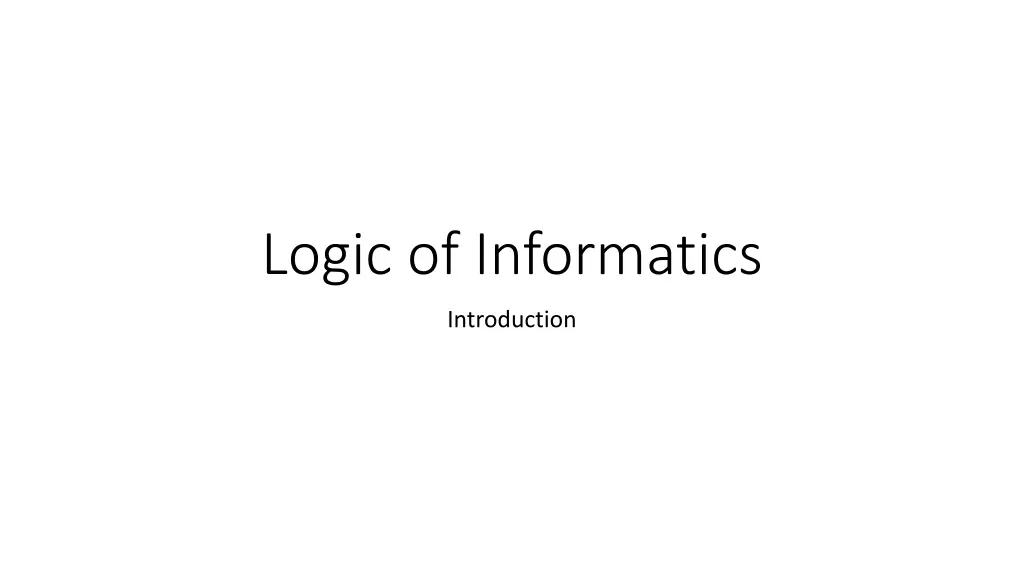
Understanding Logic and Reasoning in Computer Science
Explore the fundamentals of logic and logical reasoning in computer science, covering topics such as the definition of logic, logical reasoning processes, examples of logical reasoning, applications of logic in various fields, and types of propositions in term logic.
Download Presentation

Please find below an Image/Link to download the presentation.
The content on the website is provided AS IS for your information and personal use only. It may not be sold, licensed, or shared on other websites without obtaining consent from the author. If you encounter any issues during the download, it is possible that the publisher has removed the file from their server.
You are allowed to download the files provided on this website for personal or commercial use, subject to the condition that they are used lawfully. All files are the property of their respective owners.
The content on the website is provided AS IS for your information and personal use only. It may not be sold, licensed, or shared on other websites without obtaining consent from the author.
E N D
Presentation Transcript
Logic of Informatics Introduction
Introduction Logics plays a special role in computer science. Logics is the calculus of computer science.
What is logic? The term "logic" refers to the science that studies the principles of correct reasoning. Logic requires the act of reasoning by humans in order to form thoughts and opinions, as well as classifications and judgments. The foundation of a logical argument is its proposition, or statement. The argument is then built on premises. The premises are the propositions used to build the argument. Then an inference is made from the premises. Finally, a conclusion is drawn.
Logical reasoning Deriving information that is implied by the information already present is a form of reasoning. Logical reasoning is the process of drawing conclusions from premises using rules of inference.
Example of Logical reasoning The Argument: If the bus arrives late and there is no friend pick up Jack, then Jack is late for his class. Jack is not late for his class. The bus did arrives late. Conclusion: Therefore, there is a friend pick up jack.
Some application of logic Database Theory, Design Verification, Security, Programming Languages and Semantics, AI Reasoning, and Common Sense reasoning, software engineering (providing specifications to programmers), and more.
What is proposition? In term logic, a "proposition" is simply a form of language: a particular kind of sentence, in which the subject and predicate are combined, so as to assert something true or false. Can argued to either TRUE or FALSE.
Type of Proposition Atomic proposition: a proposition that cannot be further subdivided. Example: Let A be "The sun is shining". A is an atomic proposition. We can say also that "The sun is shining" is an atomic proposition. Compound proposition: comprises of atomic propositions and logical connectives such as AND, OR, NOT Let A be "The sun is shining", and B be "The sky is blue". The expression A and B is a compound proposition.
Examples of Proposition Proposition: The sum of the number 4 and 5 equals 9. Betty is the driver of the car. Barack Obama is sitting down or standing up. If Opus is a penguin, then Opus doesn t fly Not Proposition Barack Obama how to ride a bicycle If the fire alarm rings, leave the building. Look out! How far is it to the next town?
Alternative Symbols of Propositional Connectives : ! : & : | : -> : NOT AND OR IMPLICATION <-> BIIMPLICATION
Truth Tables LOGICAL NOT LOGICAL IMPLICATION Pronounced: ? ??????? ? LOGICAL AND LOGICAL BIIMPLICATION Pronounced: ? ?? ??? ???? ?? ? LOGICAL OR
Examples Evaluate the following expressions for all possible truth values to express their Boolean functions as a set-theoretic function. 1. ? ??? ? ?? ? 2. ??? ? ?? ? 3. ? ??? ? ?? (??? ? ??? ??? ?)
Logical Equivalence Two formulas ? and ? are logically equivalent, denoted ? ? if they have the same truth value for all values of their basic propositions
Propositional Equivalences Tautology Contradiction Contingency : the proposition is always true : the proposition is always false : a proposition that is neither a tautology nor a contradiction ? ~? ? ~? ? ? Contingency Contradiction Tautology
